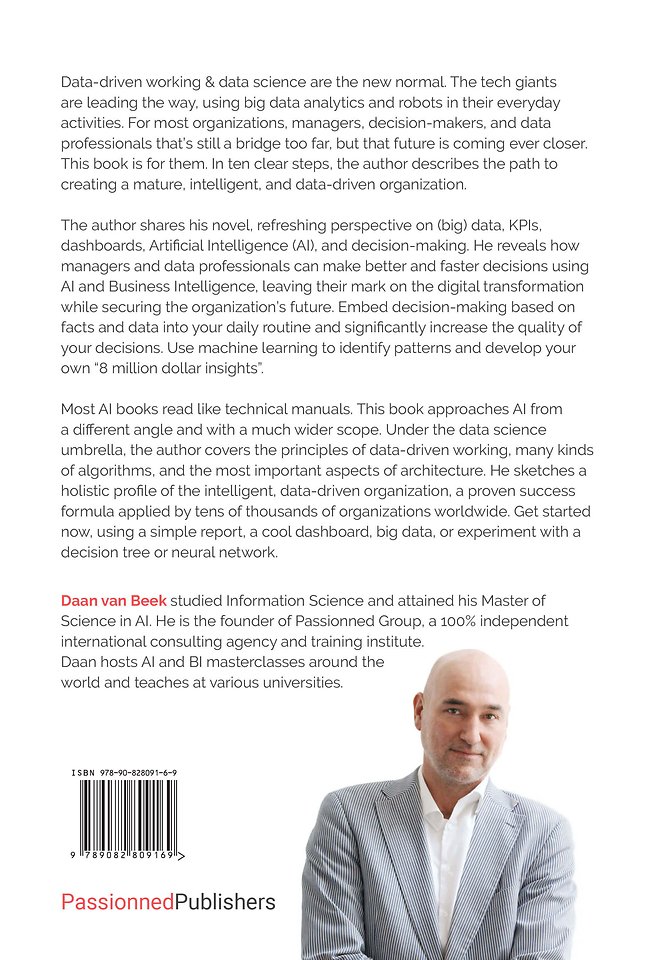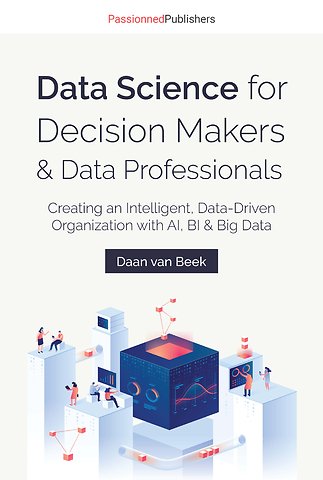



Organisaties datagedreven laten werken. Dat is de passie van Daan van Beek. Hij adviseert en faciliteert organisaties rond slimme business intelligence, AI strategie & datagedreven beslissingen. Hij is oprichter van Passionned Group, keynote speaker, consultant en auteur. Hij geeft gastcolleges en masterclasses BI en AI, o.a. bij TIAS, in India, Maleisië, Suriname, Zuid-Afrika en de VS.
Meer over Daan van BeekData Science for Decision Makers & Data Professionals
Creating an Intelligent, Data-Driven Organization with AI, BI & Big Data
Gebonden Engels 2021 1e druk 9789082809169Samenvatting
Data-driven working & data science are the new normal. The tech giants are leading the way, using big data analytics and robots in their everyday activities. For most organizations, managers, decision-makers, and data professionals that’s still a bridge too far, but that future is coming ever closer. This book is for them. In ten clear steps, the author describes the path to creating a mature, intelligent, and data-driven organization.
The author shares his novel, refreshing perspective on (big) data, KPIs, dashboards, Artificial Intelligence (AI), and decision-making. He reveals how managers and data professionals can make better and faster decisions using AI and Business Intelligence, leaving their mark on the digital transformation while securing the organization’s future. Embed decision-making based on facts and data into your daily routine and significantly increase the quality ofyour decisions. Use machine learning to identify patterns and develop yourown “8 million dollar insights”.
Most AI books read like technical manuals. This book approaches AI from a different angle and with a much wider scope. Under the data science umbrella, the author covers the principles of data-driven working, many kinds of algorithms, and the most important aspects of architecture. He sketches a holistic profile of the intelligent, data-driven organization, a proven success formula applied by tens of thousands of organizations worldwide. Get started now, using a simple report, a cool dashboard, big data, or experiment with a decision tree or neural network.
Trefwoorden
Specificaties
Lezersrecensies
Inhoudsopgave
Acknowledgments
Introduction
1. The importance and benefits of data science
1.1 Introduction
1.2 Fundamental developments
1.3 The Data-Decision gap
1.4 Twenty-five advantages of effective data science
2. Data science processes and the intelligent organization
2.1 Introduction
2.2 The four maturity levels of data science
2.3 The three stages of the intelligent organization
2.4 The contours of the intelligent organization
2.5 Four key concepts
3. The senses of the intelligent organization
3.1 Introduction
3.2 Developing sensors: four approaches
3.3 Key Performance Indicators: KPIs
3.4 Machine learning models & big data
3.5 Valuable insights
3.6 The context of sensors and indicators
3.7 Criteria of information and indicators
3.8 Setting norms and targets for indicators
4. The brain of the intelligent organization
4.1 Introduction
4.2 Processing: turning data into knowledge & action
4.3 AI, algorithms, and machine learning
4.4 The processors: stakeholders
4.5 Requirements of the processing cycle
4.6 Business Intelligence frameworks
5. The limbs of the intelligent organization
5.1 Introduction
5.2 Research the necessity of an agile organization
5.3 Expertise
5.4 The structure of the agile organization
5.5 Social infrastructure
6. The architecture of the intelligent organization
6.1 Introduction
6.2 Principles dictate the architecture
6.3 The data warehouse and ETL
6.4 The data lake
6.5 Portals, mobile data science, and reflex BI
6.6 Metadata: the glue of the intelligent organization
7. Data science instruments and applications
7.1 Introduction
7.2 Data science instruments
7.3 Data science applications
8. Data science projects
8.1 Introduction
8.2 How to approach data science projects
8.3 The data science project cycle: approach & steps
8.4 Top ten data science risks and obstacles
8.5 Data science roles and competencies
9. Data science strategy and governance
9.1 Introduction
9.2 Data science strategy and maturity: the map
9.3 Governance of the BI cycle: the compass
9.4 The BI Competency Center (BICC)
9.5 The data science roadmap
9.6 Privacy legislation and ethics
10. The future of organizations, society, and data science
10.1 Introduction
10.2 The future of data science
10.3 The social effects of AI and data science
Epilogue
Reference List
Index
Vergelijkbare boeken
Anderen die dit boek kochten, kochten ook
Rubrieken
- advisering
- algemeen management
- coaching en trainen
- communicatie en media
- economie
- financieel management
- inkoop en logistiek
- internet en social media
- it-management / ict
- juridisch
- leiderschap
- marketing
- mens en maatschappij
- non-profit
- ondernemen
- organisatiekunde
- personal finance
- personeelsmanagement
- persoonlijke effectiviteit
- projectmanagement
- psychologie
- reclame en verkoop
- strategisch management
- verandermanagement
- werk en loopbaan











